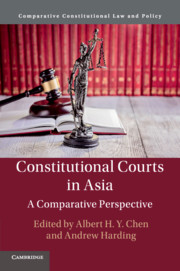
- Cited by 8
-
Cited byCrossref Citations
This Book has been cited by the following publications. This list is generated based on data provided by Crossref.
Read, Katherine and Griffiths, Laura 2019. Current Awareness. Legal Information Management, Vol. 19, Issue. 01, p. 68.
LAWRENCE, Benjamin 2020. Outlawing Opposition, Imposing Rule of Law: Authoritarian Constitutionalism in Cambodia. Asian Journal of Comparative Law, Vol. 15, Issue. 2, p. 225.
2020. Book Notes. Law & Social Inquiry, Vol. 45, Issue. 1, p. 265.
Bui, Ngoc Son 2021. Global constitutionalism: Asia-Pacific perspectives. Global Constitutionalism, Vol. 10, Issue. 2, p. 221.
Yap, Po Jen and Lin, Chien-Chih 2021. Constitutional Convergence in East Asia.
Lee, Hyun Jung 2022. Discrimination Based on Sexual Orientation. Vol. 8, Issue. , p. 75.
Viola, Pasquale 2022. Climate Constitutionalism Momentum. p. 41.
Dressel, Bjoern 2024. Courts and Politics in Southeast Asia.
- Publisher:
- Cambridge University Press
- Online publication date:
- September 2018
- Print publication year:
- 2018
- Online ISBN:
- 9781108163903


